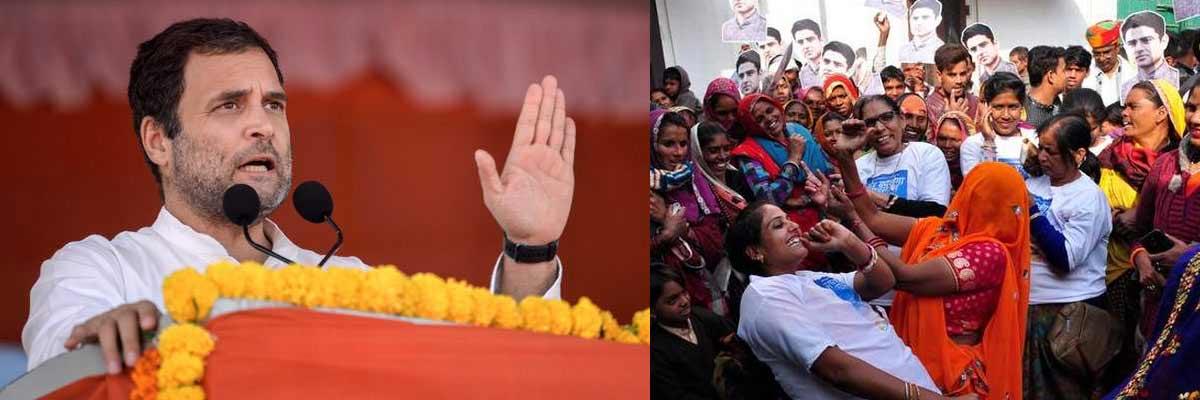Live
- ‘Art from Garbage’ exhibition showcases civic workers’ creativity
- Must-Watch Streaming Originals for 2024: Top Picks
- Tumakuru implements emergency response system for women’s safety
- Sujeet Kumar elected to RS unopposed
- ACTO, two others held for Rs 4 cr fraud
- Adopt tech-based probe process: DGP Khurania
- Bhubaneswar: Four fraudsters held for operating fake gaming app
- Majhi asks new recruits to shun corruption
- Modi’s bold decision: Bommai hails PM
- Devotees experience normal rush at Tirumala amidst long queues
Just In

The Congress recorded its bestever performance against the BJP since the disastrous 2014 Lok Sabha polls capturing power in the three Hindi heartland states and reviving its hopes in the next general elections But the outcome has also sent signals that defeating the BJP nationally may not be an easy task
New Delhi: The Congress recorded its best-ever performance against the BJP since the disastrous 2014 Lok Sabha polls capturing power in the three Hindi heartland states and reviving its hopes in the next general elections. But the outcome has also sent signals that defeating the BJP nationally may not be an easy task.
Except for Chhattisgarh, where the party won a two-thirds majority, the results were not as resounding as the Congress would have liked, especially in Madhya Pradesh and Rajasthan where it failed to cross the half-way mark on its own by just two seats.
It lost power in Mizoram, the only northeastern state it had, and was routed in Telangana where its decision to go with the Telugu Desam Party evidently boomeranged.
The verdict, with the Congress poised to form governments in Chhattisgarh, Rajasthan and Madhya Pradesh, coincided with the first anniversary of Rahul Gandhi's elevation as party chief, raising his stature as a leader and enhancing his image as a serious politician.
The outcome is expected to energize the Congress rank and file who have been largely starved of election victories since its 2014 debacle. The latest victory is the first time since 2014 when the Congress has defeated the BJP in a straight contest.
Questions remain if the verdict is strong enough to dent the image of Prime Minister Narendra Modi as an effective campaigner and communicator but it is likely to give some confidence to Congress workers that the party has a chance to turn the tables if there is a "Modi versus Rahul" contest in 2019.
The outcome will strengthen the position of the Congress in the emerging alliance of opposition parties to take on the BJP-led alliance in 2019 and increase worries of Modi and BJP chief Amit Shah in the Hindi heartland states where the BJP won most seats in the 2014 Lok Sabha battle.
The Congress has performed well as a challenger but has found it hard to defend its incumbent governments.
The results showed that the Congress can build its campaign around the issues of agrarian distress, unemployment, demonetization, corruption, security of women, Goods and Services Tax (GST), autonomy of institutions and "misuse" of investigative agencies.
The outcome has given the opportunity to Congress to pose a challenge to the BJP though it would be an uphill challenge to implement its promise of farm loan waivers. It had attacked the BJP governments in the states and the Centre on the issue.
Rahul Gandhi ran an energetic campaign since the announcement of polls in the five states in October and held 62 rallies, targeting Modi in every meeting.
He addressed 19 public meetings and held one roadshow in Chhattisgarh, 25 public meetings and four road shows in Madhya Pradesh, 19 public meetings and two roadshows in Rajasthan, 17 public meetings in Telangana and two rallies in Mizoram.
Gandhi was able to effect an organisational coherence in the poll-bound states, overcoming one of the party's weaknesses.
He made organisational changes and put Kamal Nath as party chief in faction-ridden Madhya Pradesh. The decision was made in April, barely seven months before the Assembly polls leaving the new state chief little time to build his campaign.
The results are expected to lead to questions in the Congress if its decision not to project a Chief Ministerial candidate was the best strategy.
The BJP's strong performance in Rajasthan and Madhya Pradesh despite anti-incumbency apparently shows that the 2019 election will need a much more sustained effort by the Congress to dislodge the Modi government.
Though the Congress won more seats than BJP in both these states, the two parties have nearly the same vote share.
The victory of TRS in Telangana has boosted the profile of state Chief Minister K. Chanrasekhar Rao who has pledged to form a third front that does not include BJP or Congress. This could counter the efforts of his rival, TDP leader and Andhra Pradesh Chief Minister N. Chandrababu Naidu, to bring opposition parties, including Congress, on one platform.
The Congress could not win a full majority in Rajasthan, falling short by two seats in a cyclical rotation in which both BJP and Congress have been forming governments alternately in the last 20 years.
In Madhya Pradesh, where BJP has been in power for the past 15 years, it could not secure a thumping majority like it did in the neighbouring Chhattisgarh and is all set to form a government with the support of BSP and SP.
In Chhattisgarh, it won after parting ways with former Chief Minister Ajit Jogi who floated his own party.
Gandhi has indicated that the Congress will continue to build its campaign in the Lok Sabha elections around the issues it raised during the Assembly polls. He has also said that the opposition parties will unitedly fight the polls.
With the opposition unlikely to project a Prime Ministerial candidate, the BJP is likely to play this to its advantage in the Lok Sabha elections by making it "Modi versus who" battle.

© 2024 Hyderabad Media House Limited/The Hans India. All rights reserved. Powered by hocalwire.com







